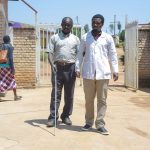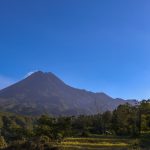Written by Matthijs van Pijkeren, Faith & Development advisor, Tearfund Netherlands
A few years ago I spent a night in a village on the slopes of a volcano on Java island, Indonesia, as guest of Yusmita and Muljo. While the volcano slept, my assumptions on faith identities exploded. My assumption was that I was invited to a fairly homogeneous community of Muslims who had always been Muslim. And that religion was a sensitive topic to avoid.
When I sat with Muljo and his friend Kamayati on the couch, Muljo talked about growing up in a Buddhist family, becoming a Muslim and that he now belonged to a Muslim sect. His community had been attacked recently by other Muslims that regarded him as unfaithful. His friend Kamayati first was a Christian and was now a regular Muslim. But is there any fighting between the two of you, I asked? “Peace peace, no fighting!” Then their friend Daniel arrived. I asked him: and what is your religion? “I used to be a Muslim,” he shared. “But now I am the pastor of a Pentecostal Christian church just one village up the mountain.” With open mouth of amazement, I looked at the three of them, laughing at me: the three friends who worked together, lived together and talked about their respective faiths together. Is this a volcano bound to erupt? A sensitive subject better to avoid? No, they shared: “Religion is not about fighting.”
Natural network
Tearfund has 50 years of experience of working through local Christian organisations, churches and individuals in humanitarian relief, different development themes as well as advocacy. For us, working with faith based actors is part of our identity. This is our natural network with branches all over the globe. However, why should other actors such as embassies, governments, secular NGOs also take religion into account? Because engaging with Faith Based Actors helps with getting a more holistic perspective on the world.
Research on the role of religion
The last decades has seen a surge of academic interest on the role of religion in diplomacy, international politics, sustainable development. A recent article[1] gives a helpful overview of the common themes that have been researched and the way forward. Next to academic researches, there have been several publications that particularly try to bridge the gaps between faith based actors and other stakeholders. Tearfund Netherlands contributed for instance to a synthesis research that that was commissioned particularly in order to address assumptions that may be present in “western, secular” stakeholders when engaging with religion and faith based actors.[2]
The complexity and diversity of faith actors
Based upon research and our own practice, it is important to acknowledge the complexity of faith, religion and faith based actors, when thinking about development. Since 9-11 there is no denying that religion is important to a vast majority of people in the world. To such an extent that the ‘secular’ West, where broadly speaking religions are in decline, can be seen as the exception rather than the rule. However, that is only the starting point. In order to take religion into account in diplomacy, relief or sustainable development, it is necessary to be nuanced. To recognise that faith identities are fluid, complex, contextual and to an extent individual. Or to put in in another way: religion to a secular or western observer is often viewed as a static, one-dimensional identity but when you zoom in on a particular situation, context, country, it is much more dynamic, such as my encounter on the volcano showed.
Willingness to understand
It helps to be interested in this complexity, these nuances. When you ask individuals, groups or organisations about their faith or worldview, most of the time you touch upon a core part of their identity, their values. And even if those conversations might be difficult at the start, showing a willingness to understand each other is always rewarding.
An example of this is JISRA. The Joint Initiative for Strategic Religious Action (JISRA) is a partnership of 50 civil society organisations (CSOs) based in 7 countries. This international, interreligious partnership is implementing a five-year programme, as part of the Power of Voices program financed by the Netherlands, to further peaceful and just societies where all enjoy Freedom of Religion and Belief (FoRB). The consortium supports religious actors to become agents of peace and inclusion, and strengthen their capacities to engage in advocacy work. In this we intentionally try to involve women and youth.
With 50 CSOs involved, part of whom identify as faith based or interreligious, you can imagine the diversity of motivations and experiences. What brings this alliance together though is a willingness to listen to each other, to learn from each other, to take the other seriously.
When acknowledging the diversity and complexity of faith in development, how can you foster a dialogue between faith actors and other stakeholders? And on what themes? In the second part of this article, we’ll talk more unboxing Faith Actors.
[1] Wilkinson (2022) Re-framing Common Themes in Religions and Development Research, The Review of Faith & International Affairs, 20:4, 91-106, DOI: https://doi.org/10.1080/15570274.2022.2139542
[2] Goris & Kapazoglou (2022). Working with Faith-Based Actors for Development: A Synthesis Report. The Broker. https://www.prismaweb.org/nl/wp-content/uploads/2022/04/PRISMA-SYNTHESIS-Report-final.pdf





